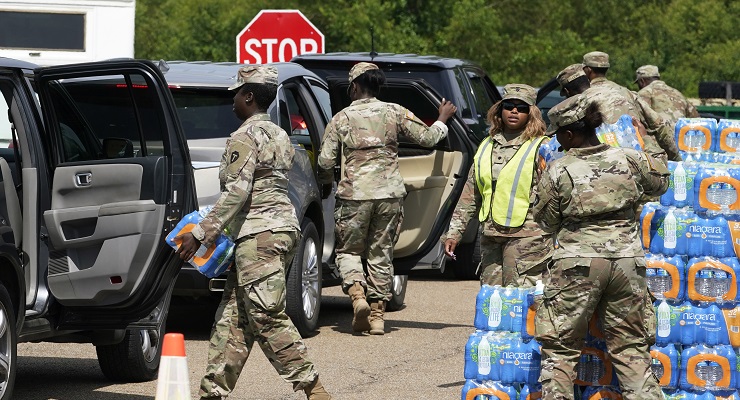
It has now been roughly a week that most of the city of Jackson, Mississippi, have gone without access to drinkable water. Taps dribble out brown water that remains undrinkable after it’s boiled — and that’s if anything comes out at all.
This is the culmination of years of a neglect-induced water crisis for the 80% Black population, and a clear example of where wrecking crew politics logically ends up.
The National Guard has had to bring in pallets stacked with bottled water; while this time we were spared the billionaire autocrat tossing out essentials to citizens like a game show host — as happened after Puerto Rico was devastated by a hurricane in the Trump years — it nonetheless has the hallmarks of a failed state.
Indeed, imagine the furrowed-brow, paternal-concern coverage these events would get in The Washington Post and elsewhere if they had happened in Haiti or Cuba:
- For nearly eight years, the water supply in the city of Flint, Michigan, was contaminated with lead. Somewhere between 6000 and 12,000 children were exposed to high levels of lead in their drinking water, increasing the list of a host of diseases associated with lead poisoning. Though the crisis is officially over, a lack of trust in government means citizens are still reluctant to drink the city’s water
- In 2020 and again in 2021 life expectancy in the US dropped — while most countries of comparative wealth saw similar issues in 2020 on account of the pandemic, most rebounded during 2021. The biggest drop between 2019 and 2021 was among America’s indigenous population, which dropped by more than six and a half years in that time
- Allowing for the fact that countries such as China may not have given the most accurate accounting, the US had the most deaths from COVID of any country
- According to research by the Commonwealth Fund, the US has the worst healthcare system when compared with 11 other high-income countries, despite spending the highest proportion of its gross domestic product on healthcare.








The remarkable news is that the USA has been able to fight expensive wars &, most recently, fund the Artemis space project (at several billion dollars) while their water supply has been in decline. The human race cannot survive on Coca Cola.
Who needs water when you have your guns and bibles?
Not just JC, should he arise, again, will be able to walk on water it will that salty, We all we be able to.
Of course it’s a failed state. In spite of being the wealthiest nation state in world history, the US has a worse infant mortality rate than Cuba, a poor nation subject for two generations to a vicious US-enforced siege of its economy. When you can’t (or won’t) keep your own kids alive, then you’re a definite failure.
And let’s stop this crap about it being the world’s leading democracy. It’s not. Democracy is rule by the people. The US is a plutocracy, where the politicians represent the rich lobbyists and corporations who control and fund them.
Why do so many in the West (including our pathetic Australian major parties) idolise them?
Take a look at Lake Mead, agriculture production will decline next.
Corporate US are rentier capitalists – they demand golden eggs while starving the goose. Bridges fall down and urban water systems collapse because it costs to maintain them. Profit uber alles.